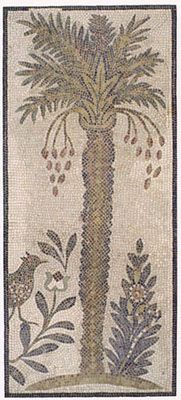Tree of Paradise: Jewish Mosaics from the Roman Empire
February 17—June 8, 2008
This exhibition presents the reconstruction of an ancient mosaic floor from a synagogue in Hammam Lif, Tunisia (the ancient town of Naro, later called Aquae Persianae by the Romans). A Latin inscription in one of the surviving panels records that the mosaic floor was a gift to the synagogue from a certain Julia, a resident of Naro in about 500 C.E. Other mosaic panels in the exhibition, datable to the first or second century C.E. originated either in an earlier part of the same synagogue or in a nearby building.
The mosaics were discovered by chance in 1883 by a French army captain, Ernest de Prudhomme, while preparing ground for gardening. In 1905, the Brooklyn Museum acquired most of the panels Prudhomme had owned and transported back to his home in Lyon. The mosaics, along with contemporary jewelry, coins, marble statues, ritual objects, and textiles from the Brooklyn Museum’s collection shed light on the role of synagogues in the Diaspora during Late Antiquity, the development of Jewish art in the Roman period, the importance of female patrons in the ancient Jewish community, connections among early Christian, Jewish, and Pagan symbolism in this period, and the relationship between ancient and modern understanding of the synagogue as an institution. The works of art in the exhibition reveal a society where Jews were more integrated and accepted than ancient texts would suggest.
Tree of Paradise: Jewish Mosaics from the Roman Empire is organized by the Brooklyn Museum and made possible by the Martha A and Robert S. Rubin Exhibition Fund.
The presentation of this exhibition at the McMullen Museum is underwritten by Boston College with major support from the Lassor and Fanny Agoos Charity Fund.
A catalogue by the exhibition’s curator, Edward Bleiberg, Curator of Egyptian, Classical and Ancient Middle Eastern Art at the Brooklyn Museum, accompanies the exhibition.


